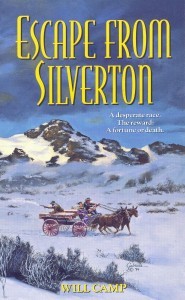Preston Lewis's Blog, page 3
April 8, 2020
Western Collection Redux
I am pleased to announce the release today of the second volume in the Preston Lewis Western Collection, 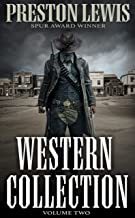 which includes five of my early westerns.
which includes five of my early westerns.
Thanks to the fine folks at Wolfpack Publishing for bringing out this e-book anthology that includes my first two novels, Hard Texas Winter and New Mexico Showdown. Other books in the collection originally written under my Will Camp pseudonym include Blood Saga, Vigilante Justice and Escape from Silverton, which has a backstory I’ve never before shared publicly about the kinds of games authors play to amuse themselves and annoy their wives.
I had a dream years ago when I was working on the manuscript that became Escape from Silverton and, unfortunately, shared that dream with Harriet. In the dream Will Rogers came to me and asked me to help him write an adage that he would forever immortalize him. After days of hard thought, I returned to Mr. Rogers, Will not Fred, and told him I’d come up with the following saying: “I never saw a man I didn’t like.” He liked it but said I wasn’t quite there and to come back to the next day with the revised version and I did. However, instead of coming back with “I never met a man I didn’t like,” I revised the quote to say “I never manned a saw I didn’t like.”
Not only did I have a dream, I unfortunately shared it with Harriet who hurrahed me incessantly over it. So, I decided I would fix her wagon and teach her a lesson and show her a writer’s revenge. Fast forward two years later and I had just received my writer’s copies of Escape from Silverton and shared one with Harriet to read. About three nights later we were in bed as she neared the end of the book and all of a sudden she cried out, “I can’t believe this,” and then flung the book across the bedroom.
By then, I’d forgotten my writer’s revenge and cried out, “What’s wrong with you?”
“What line?”
“The one ‘I never manned a saw I didn’t like’,” she cried out.
Then it came back to me. I had contrived a scene where my protagonist in trying to escape from Silverton, Colorado, had broken a wagon’s rear wheel and not having a spare had sawed the back half of the wagon off, making a cart that would carry him to Durango and safety.
While my high school and college English teachers always talked about writers incorporating symbolism in their novels, the writers I’ve known over the years were more likely to write inside jokes and gags in their works to amuse themselves and tweak their acquaintances.
If there’s a lesson here, it’s never annoy a fiction writer because he (or she) can get back at you in ways you may never know.
As for the second volume of the Preston Lewis Western Collection, it’s available from this Amazon link.
March 20, 2020
Western Collection
A day after its Kindle release, Volume 1 of the Preston Lewis Western Collection was ranked on four Amazon Best Seller Lists:
No. 4 in Classic Fiction Anthologies & Collections,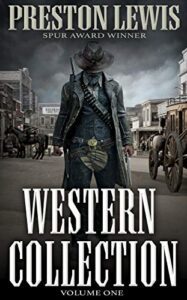
No. 7 in Classic American Fiction,
No. 8 in Louis L’Amour Westerns, and
No. 29 in Westerns
The anthology includes five of my previous novels, starting with Blood of Texas, my Spur Award-winning novel of the Texas Revolution. Lone Survivor, a Spur finalist, tells the story of the last participant of a Texas feud and the terrible secret he carried for years.
Also included in the anthology is Choctaw Trail, one of my personal favorites, about a federal marshal in Indian Territory having to track down his own son. Tarnished Badge about rustling in the Texas Panhandle and Santa Fe Run about Indian Agency corruption in New Mexico Territory round out the collection.
The e-book omnibus edition is the equivalent of 1,129 print pages and is available or 99 cents from Amazon. Thanks to Wolfpack Publishing for making this possible.
February 20, 2020
Rio Ruidoso
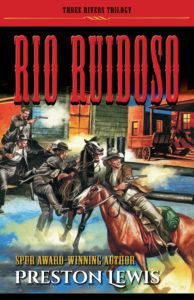 I’m excited to announce that Rio Ruidoso, the first book in my Three Rivers Trilogy on the Lincoln County War, was released this week as a Five Star Western from Gale, a Cengage Company. In many ways, this book was six decades in the making from the time I first visited Lincoln, New Mexico, as a seven-year-old with my parents and little brother.
I’m excited to announce that Rio Ruidoso, the first book in my Three Rivers Trilogy on the Lincoln County War, was released this week as a Five Star Western from Gale, a Cengage Company. In many ways, this book was six decades in the making from the time I first visited Lincoln, New Mexico, as a seven-year-old with my parents and little brother.
In Lincoln when I was a wide-eyed kid I walked for the first time in the steps of Billy the Kid, starting a lifelong fascination with life in the Old West. Lincoln was just a side trip from our vacation destination of Ruidoso, a virtual paradise from our West Texas home, with mountains and pine trees and streams, things you could only read about in Midland.
Having spent most of my life in West Texas, I’ve made dozens of trips back to the mountains of Ruidoso and on every visit I always take a journey back to Lincoln. The other day I was going through some old family photos and found one of myself and my brother with our dad in a Ruidoso stream on our first trip in 1957. I hope to one day find a photo of me in Lincoln on that same trip.

Rio Ruidoso, 1975
Shortly after I returned from that trip, Mom took me to the Midland City-County Library and I checked out The Tragic Days of Billy the Kid by Frazier Hunt and devoured the book, the first I ever read on Billy and the Lincoln County War. I’ve probably consumed more books on the Lincoln County War than on any other subject in my life, so it was only natural that I would eventually write about it, first with The Demise of Billy the Kid, and now with Rio Ruidoso. It’s not like I’m the first to see the dramatic potential of the Kid or the Lincoln County War, so I looked at some of the lesser known events before, during and after the feud and tried to develop my plot around those events in my latest book.
Rio Ruidoso focuses on some of the racial bigotry surrounding the Texas expatriate Horrell Brothers and the political corruption of Lawrence G. Murphy, the region’s economic kingpin, that preceded the Lincoln County War.
My book received a great review from Booklist in its Jan. 1, 2020 edition as follows: “Lewis begins the Three Rivers Trilogy in the weeks leading up to the Lincoln County War (1878–1881), a conflict in the New Mexico Territory made famous because of Billy the Kid’s participation in its most notorious skirmishes. Taciturn Wes Bracken arrives in Lincoln County after leaving bad memories of the Civil War behind in Arkansas. Before he even has the opportunity to meet up with his brother, Luther, he ends up a marked man when he saves a Mexican-American family from a local posse. Things only get worse from there: Luther’s alcoholism is more severe than Wes ever suspected, Luther’s claim to the homestead is tenuous, and a band of horse thieves has been plaguing the area. Plus, it’s unclear which one of Lincoln County’s two wealthy businessmen has the people’s best interests at heart, and which one is plotting against them all. Lewis deftly weaves actual stakeholders from the War into the action (including Jesse Evans, John Chisum, and Lawrence Murphy) and successfully uses a sweet and progressive love story to move the engaging plot forward. — Sarah Steers”
The trilogy was named for the three rivers—Rio Ruidoso, Rio Bonito and Rio Hondo—that come together to feed the Pecos River. The second book in the trilogy, Rio Bonito, is now with the editors for a 2021 publication date, and I’m doing the final research (more reading on the feud and the Kid, yeah!) for Rio Hondo, which is due in December. None of that would ever have been possible without that first trip to Lincoln years ago and without the support of my editors today. So, a special thanks go to Senior Editor Tiffany Schofield and Editor Hazel Rumney for their faith in me and for their editing skills which greatly enhanced the final product.
If you’re interested in a new look at the events preceding the Lincoln County War, check out Rio Ruidoso on Amazon.
February 6, 2020
First Herd No. 1
As of 3:30 p.m. today, barely 24 hours after its release, my new comic western First Herd to Abilene is No. 1 in Amazon’s Western Science Fiction category; No. 5 in Classic Humor Fiction; and No. 7 in Classic Historical Fiction.
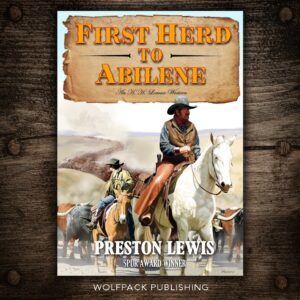 While I remain flummoxed about the Western Science Fiction category and its criteria, it’s good to be No. 1 on any list. On top of that, the omnibus edition of Bluster’s Last Stand, which includes all four previous novels in the H.H. Lomax series, is now No. 15 on the same Western Science Fiction list.
While I remain flummoxed about the Western Science Fiction category and its criteria, it’s good to be No. 1 on any list. On top of that, the omnibus edition of Bluster’s Last Stand, which includes all four previous novels in the H.H. Lomax series, is now No. 15 on the same Western Science Fiction list.
At No. 5 in the Classic Humor Fiction category, First Herd trails No. 1 Alphalacious Billionaires Box Set, Hotshot Boss, Diary of a Bad Boy and The Princess Bride.
In the Classic Historical Fiction category, First Herd at No. 7 trails Pulitzer Prize winners The Color Purple and The Keepers of the House at Nos. 1 & 2; then A Healer for the Highlander, The Princess Bride, Circe and Highlanders Last Chance.
So, I’m traveling in some diverse company. Thanks to Wolfpack Publishing for making it possible.
February 5, 2020
Western Science Fiction?
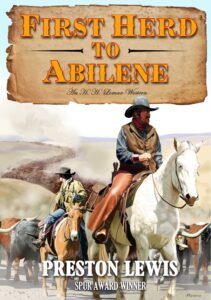 First Herd to Abilene was just released today as a Kindle Book and started out as No. 20 on Amazon’s Western Science Fiction list. Now I have no idea how it got on the Western Science Fiction list or exactly what Western Science Fiction is, but as of this writing it has moved up to No. 14 and is ahead of literary luminary Cormac McCarthy’s The Crossing at No. 19.
First Herd to Abilene was just released today as a Kindle Book and started out as No. 20 on Amazon’s Western Science Fiction list. Now I have no idea how it got on the Western Science Fiction list or exactly what Western Science Fiction is, but as of this writing it has moved up to No. 14 and is ahead of literary luminary Cormac McCarthy’s The Crossing at No. 19.
First Herd checked in at No. 800 in the General Humorous Category, which I understand. But Western Science Fiction? I can explain Western and I can explain Fiction, but Science? When our kids were still in school and came home with questions, I could answer history and English questions and that was about it. When they came with queries in math, biology, geology, physics, chemistry or music, I would always reply, “That’s a science question, go ask your mother!”
So, I’m referring the question of Western Science Fiction to Harriet for an explanation.
February 4, 2020
Lomax Hits the Cattle Trail
 I’m delighted to announce the release of First Herd to Abilene, the fifth volume in my Memoirs of H.H. Lomax series, by Wolfpack Publishing in e-book format on Amazon. This is my first original western from Wolfpack, and I am excited to continue the adventures of H.H. Lomax with this up-and-coming publisher.
I’m delighted to announce the release of First Herd to Abilene, the fifth volume in my Memoirs of H.H. Lomax series, by Wolfpack Publishing in e-book format on Amazon. This is my first original western from Wolfpack, and I am excited to continue the adventures of H.H. Lomax with this up-and-coming publisher.
The cover by artist and fellow western writer Tony Masero is absolutely stunning, one of my best covers ever.
First Herd to Abilene is now available on Amazon for just 99 cents. It follows my hard-luck hero H.H. Lomax as he leaves home in northwest Arkansas for his own safety in the aftermath of the Civil War. As he tries to make it on his own, he is taken in by Wild Bill Hickok; helps promote Joseph McCoy’s dream of making Abilene, Kansas, a Cowtown; leads the first herd from Texas back to Abilene; and encounters Wild Bill a final time in Deadwood, Dakota Territory, where Calamity Jane falls for him.
Based on solid research, the historical novel is an entertaining ride with a touch of Old West bawdiness. Wolfpack describes First Herd to Abilene as “Historically Sound and Hilariously Funny!”
If First Herd to Abilene is your initial ride with H.H. Lomax and you enjoy the journey, you 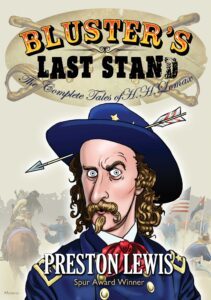 can catch up with his previous adventures in an H.H. Lomax omnibus edition released in December by Wolfpack. Titled Bluster’s Last Stand, the collection includes all four previous Lomax novels starting with The Demise of Billy the Kid, the original novel in the series.
can catch up with his previous adventures in an H.H. Lomax omnibus edition released in December by Wolfpack. Titled Bluster’s Last Stand, the collection includes all four previous Lomax novels starting with The Demise of Billy the Kid, the original novel in the series.
Then the omnibus offers The Redemption of Jesse James and Mix-Up at the O.K. Corral, both of which were Spur Finalists, and concludes with the namesake novel Bluster’s Last Stand, which won the Gold Will Rogers Medallion Award for western humor in 2018. And, the good news, you can have all four books for just 99 cents on Amazon. The cover, also by Tony Masero, is my favorite of all among the 30-plus westerns I’ve published because it truly captures the tenor of the Lomax novels.
So, my thanks go to Tony Masero for the wonderful Lomax covers; to Mike Bray, Wolfpack president and publisher extraordinaire, for his interest in publishing my works; Rachel Del Grosso, associate publisher, for her managerial efficiency; Paul Bishop, acquisitions editor, for his friendship; and Lauren Bridges, associate editor, for her editing skills that improved First Herd to Abilene immensely.
December 17, 2019
The Hope Chest
As of mid-December Amazon’s No. 1 Bestseller for historical fiction anthologies was the The Spoilt Quilt and Other Frontier Stories: Pioneering Women of the West, which includes my tale “The Hope Chest” among 16 short stories.
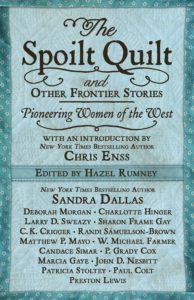 As a result, I can now claim to be a best-selling author! Or, at least 1/16th of a best selling author, thanks to my fellow writers. If you’re looking for an old-school gift for Christmas—a book—you might want to check out The Spoilt Quilt, which has received great reviews from Library Journal and Booklist.
As a result, I can now claim to be a best-selling author! Or, at least 1/16th of a best selling author, thanks to my fellow writers. If you’re looking for an old-school gift for Christmas—a book—you might want to check out The Spoilt Quilt, which has received great reviews from Library Journal and Booklist.
As a bit of background, “The Hope Chest” is based on family folklore of how my great grandmother escaped her Alabama home to come to Texas and marry her childhood sweetheart, who her overbearing father had driven out of Cleburne County, Alabama. I am honored to share this story with those of fifteen other fine writers in the anthology, edited by long-time editor friend Hazel Rumney.
Booklist (10-15-19) offered this review, including a mention of my short story: “Each piece in this 16-story, female-focused anthology packs a punch. The heroines confront death, disease, rape, domestic violence, and poverty, all while living in an era that denies them equal legal status . . . it’s about personal strength in a time and place when that was often the only resource an individual had in excess. To that end, The Spoilt Quilt provides brief glimpses of optimism in an otherwise overcast world.”
“If the male settlers of the western frontier found life demanding, desolate, and deadly, The Spoilt Quilt makes a convincing case that it was even worse for women. Each piece in this 16-story, female-focused anthology packs a punch. The heroines confront death, disease, rape, domestic violence, and poverty, all while living in an era that denies them equal legal status. But that is not to say the main characters lack agency; each woman fights back to the best of her ability regardless of the unfortunate scenario plotted out for her. Some use misdirection (“The Spoilt Quilt”), some use trained skills (“The Well-Witcher’s Daughter,” “Berserker on the Prairie”), some use cunning (“The Hope Chest”), some use pure, unbridled rage (“The Devil’s Rope,” “Abandoned Places”). This collection isn’t necessarily about winners and losers—if it were, many of these women would be failures, and the stories too grim to read. Rather, it’s about personal strength in a time and place when that was often the only resource an individual had in excess. To that end, The Spoilt Quilt provides brief glimpses of optimism in an otherwise overcast world.— Sarah Steers”
So, if you are wanting a reading experience with grit and heart, you should check out The Spoilt Quilt at Amazon.
October 15, 2019
Billy and Me
I’m pleased to post the cover for my upcoming Five Star novel Rio Ruidoso, the first book in my Three Rivers Trilogy on the Lincoln County War and Billy the Kid. The cover has a retro feel to it, like the art from the heyday of western novels.
And to anyone who is interested, I have review copies of this January release I am willing to send at no charge to anyone willing to read the book and post an Amazon review once it is published. All I ask is that you send me a request with your e-mail address so I can remind you when the book goes online and reviews can be posted. Just send me an e-mail request at prestonlewisauthor@gmail.com.
charge to anyone willing to read the book and post an Amazon review once it is published. All I ask is that you send me a request with your e-mail address so I can remind you when the book goes online and reviews can be posted. Just send me an e-mail request at prestonlewisauthor@gmail.com.
Now, I’m not the first author to write a novel on Billy the Kid. In fact, the trilogy will be the second time I’ve written a project featuring the Kid and Lincoln County War. My initial fictional foray into the Lincoln County War was The Demise of Billy the Kid, the first novel in my Memoirs of H.H. Lomax series. Demise brought me the greatest compliment of my writing career, but more on that in a moment.
While the Lincoln County War is a trail well-traveled by novelists, I’ve incorporated many of the lesser known incidents from the feud into the novels. The trilogy is named for the three Lincoln County rivers—Rio Ruidoso, Rio Bonito and Rio Hondo—that flow through the critical section of the county where much of the violence took place.
Even before the legendary feud began, Lincoln County was seething with economic, political, personal and racial vendettas. Rio Ruidoso places my protagonist Wes Bracken in Lincoln County in the months prior to the Lincoln County War when the Horrell brothers, a clan of Texas ex-patriots, started a rein of racial terror against the native New Mexicans. In Rio Bonito, the second book in the trilogy, Bracken vows against all odds to steer a neutral course between the feud’s warring factions. Rio Hondo, the trilogy’s final volume, follows my protagonist in the aftermath of the war proper when vendettas continued and the participants, Billy the Kid included, sought a way out of the deadly vortex they had created for themselves.
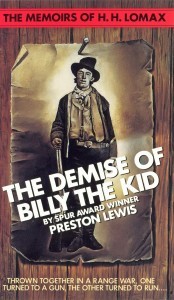 Billy the Kid and I go back a long way together. Though I never met him, of course, I’ve literally walked in his footsteps and feel like I’ve come to know him over the years as I have read so much about him. My fascination with him began in the 1950s when my parents took my brother and me on a trip to the mountains of Ruidoso, New Mexico. I was likely about eight at the time when Mom and Dad took us on a sidetrip to Lincoln, New Mexico. At the Lincoln County Courthouse I walked up the same stairs that the Kid had climbed during his incarceration and during his escape when he killed two deputies.
Billy the Kid and I go back a long way together. Though I never met him, of course, I’ve literally walked in his footsteps and feel like I’ve come to know him over the years as I have read so much about him. My fascination with him began in the 1950s when my parents took my brother and me on a trip to the mountains of Ruidoso, New Mexico. I was likely about eight at the time when Mom and Dad took us on a sidetrip to Lincoln, New Mexico. At the Lincoln County Courthouse I walked up the same stairs that the Kid had climbed during his incarceration and during his escape when he killed two deputies.
The most striking memory of that visit, though, was a display of a handgun from every sheriff in the history of Lincoln County. What was etched in my mind about that display was a little cardboard arrow hanging above one pistol barrel. Handwritten on the pointer were the words “Note the Notches.” Sure enough on the side of the barrel near the sight were three slight but intentional scratches. I could not believe that those tiny marks represented three lives snuffed out years earlier. The notches struck me as all the more sinister because they were so insignificant.
Some 20 years later in 1977 I took Harriet and our newborn son to Ruidoso for the first time. At the Lincoln County Courthouse I asked the docent where I could see the collection of sheriff’s weapons, including the one so vividly etched in my mind. The docent frowned and said they had been stolen from the courthouse about a decade earlier. Even though the FBI was called in to assist in the investigation, the guns were never recovered. I’ve tried throughout my life not to be a vindictive person, but I hate that son-of-a-witch for stealing that collection of guns and for depriving future children from seeing the weapon that stoked my imagination so. We returned to Lincoln last year—a pilgrimage to Lincoln being a necessity on every trip I take to Ruidoso and the mountains— and I asked the on-duty New Mexico Park Ranger if they had ever recovered the stolen weapons. She had never even heard of the guns, so I guess they are lost forever to the public.
I came back from my first trip to Ruidoso fascinated by Billy the Kid and started reading as many books on him as I could, starting with Frazier Hunt’s 1956 book The Tragic Days of Billy the Kid, which I checked out of the Midland County Library. Since then I’ve read dozens of books on William H. Bonney and the Lincoln County War, including many by Frederick Nolan, a British author fascinated by the Lincoln 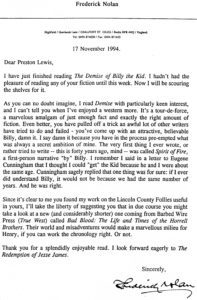 County War since it started with the murder of an Englishman, John Henry Tunstall. His book The Life and Death of John Henry Tunstall would be the first of a dozen books and numerous articles he published on the feud, culminating with the authoritative The Lincoln County War: A Documentary History in 1992. He is in my mind the leading scholar on the Lincoln County War, an accomplishment in itself since he lives in England and did most of his research from there augmented by occasional trips to the U.S.
County War since it started with the murder of an Englishman, John Henry Tunstall. His book The Life and Death of John Henry Tunstall would be the first of a dozen books and numerous articles he published on the feud, culminating with the authoritative The Lincoln County War: A Documentary History in 1992. He is in my mind the leading scholar on the Lincoln County War, an accomplishment in itself since he lives in England and did most of his research from there augmented by occasional trips to the U.S.
So, imagine my surprise on the day before Thanksgiving of 1994, just weeks after Bantam published The Demise of Billy the Kid, when I went to the mailbox and found a letter from England with Mr. Nolan’s return address on it. Being a glass-half-empty kind of a fellow, I feared he was writing me to tell me I had plagiarized a sentence or something because I had used his works extensively to try to make the book as accurate as possible, even if it was fiction.
Mr. Nolan, though, was nothing but complimentary, calling Demise “a tour-de-force, a marvelous amalgam of just enough fact and exactly the right amount of fiction.” I was beaming and still am to this day a quarter of a century later that such an authoritative historian on the Lincoln County War took the time to find my address and send me such a glowing letter about my novelization of the facts. Little acts of support from fellow authors—and Mr. Nolan has written both nonfiction and fiction including several western novels—are among the most rewarding and enduring benefits of being a writer.
August 17, 2019
Family Tale
One of pleasures of doing genealogy in addition to learning about your forebears is that you come across such interesting family stories. One of those family legends provided the genesis for a short story I wrote for The Spoilt Quilt and Other Frontier Stories: Pioneering Women of the West, a Five-Star anthology scheduled for release November 30th.
 “The Hope Chest” is based on my great grandmother Camp’s escape from an overbearing father in Alabama to come to Texas and marry her childhood sweetheart. Let’s just say Grandma Camp was clever—and sneaky. Had she not run away to marry my great grandfather, I would not be writing this or even be alive for that matter, so I owe her a great debt. She fled to Jones County, Texas, to marry her betrothed and settled on land some of which is still owned by my parents. We have in our living room the wheel chair she used in her later years as well as a kerosene lamp that graced the Camp home.
“The Hope Chest” is based on my great grandmother Camp’s escape from an overbearing father in Alabama to come to Texas and marry her childhood sweetheart. Let’s just say Grandma Camp was clever—and sneaky. Had she not run away to marry my great grandfather, I would not be writing this or even be alive for that matter, so I owe her a great debt. She fled to Jones County, Texas, to marry her betrothed and settled on land some of which is still owned by my parents. We have in our living room the wheel chair she used in her later years as well as a kerosene lamp that graced the Camp home.
Some of the details of her story came down through three generations of oral family history, but what makes the story even more fascinating was that as she was in Heflin, Alabama, trying catch the train to Texas unobserved, a newspaper reporter spotted her and wound up doing a story in the Cleburne New Era edition of September 20, 1894, in a Page 4 column headlined “Love Laughs at Locksmiths.”
The unnamed reported described my great grandmother thusly: “Standing close beside the wagon was a very pretty girl, presumably about 17 years of age, and she seemed quite nervous, as if she expected some one she didn’t care to see (her ‘pa,’ thought the news-gatherer).” With a little snooping, the newsman learned, “The young lady had long since plighted her troth to a young man who is now in far-away Texas. But her father was bitterly opposed to their ‘jinin’ hands,’ and placed restrictions upon his daughter, but ‘love laughs at locksmiths’ even, and Wednesday night she ‘stole a march’ on pa and came to Heflin.”
After the train pulled away from the depot for Texas, the reporter ended his story with these words: “The New Era wishes this unknown ‘heroine’ a happy journey over the troubled sea of life, and may her husband gather together many buffaloes and wild Mustang ponies on the desolate plains of the ‘Wild and Woolly West.’ Fare thee well!”
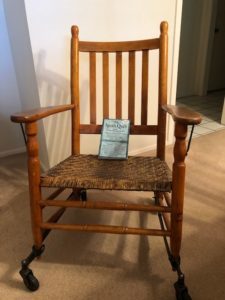 I have in my possession an original but undated clipping of the newspaper
I have in my possession an original but undated clipping of the newspaper  article which I was able to identify and date through newspapers.com. I also have the telegram her betrothed, Morgan Camp, received in Texas alerting him of his sweetheart’s departure for the Lone Star State.
article which I was able to identify and date through newspapers.com. I also have the telegram her betrothed, Morgan Camp, received in Texas alerting him of his sweetheart’s departure for the Lone Star State.
It is a pleasure to share a fictionalized account of her adventure and to be included in The Spoilt Quilt with so many fine writers who contributed other wonderful stories of women on the frontier.
June 12, 2019
Lomax to Ride Again
 Good news for the fans of H.H. Lomax as the fifth volume in the series should be out in the spring of 2020. Last month I sent off the manuscript to the publisher, Wild Horse Media, and the next volume in The Memoirs of H.H. Lomax has been added to the publication schedule.
Good news for the fans of H.H. Lomax as the fifth volume in the series should be out in the spring of 2020. Last month I sent off the manuscript to the publisher, Wild Horse Media, and the next volume in The Memoirs of H.H. Lomax has been added to the publication schedule.
First Herd to Abilene came in at 490 pages and 155,000 words. If you ever cared to see what a manuscript looks like, the accompanying photo shows that it’s not that spectacular, little more than a ream of typing paper. Even so, it is satisfying to send it and an electronic version of the manuscript to the publisher.
This is a trail drive novel unlike any other western in the genre, as is usually the case with everything Lomax gets involved in. This novel takes Lomax from the end of the Civil War to three years past the turn of the century and provides the backstory of his strained relationship with James Butler “Wild Bill” Hickok as alluded to in the preceding book in the series, Bluster’s Last Stand. In addition to Hickok, Lomax runs into Joseph G. McCoy, Calamity Jane, Jesse Chisholm and a bevy of Texas cowboys that he leads from San Antonio to Abilene, Kansas, more than 750 miles away.

Medallion
It’s another fun romp—or should I say stampede?—across the legends of the Old West. Nobody stumbles over those frontier traditions better than H.H. Lomax, the hapless protagonist who always seems to be at the right place at the wrong time to create more problems than he resolves. Even so, Lomax always finds a way to survive and even thrive as others bite the dust!
Can’t wait to see him in print again next year as First Herd should be a great sequel to Bluster’s Last Stand, which won the 2018 Will Rogers Gold Medallion Award for Western Humor!

